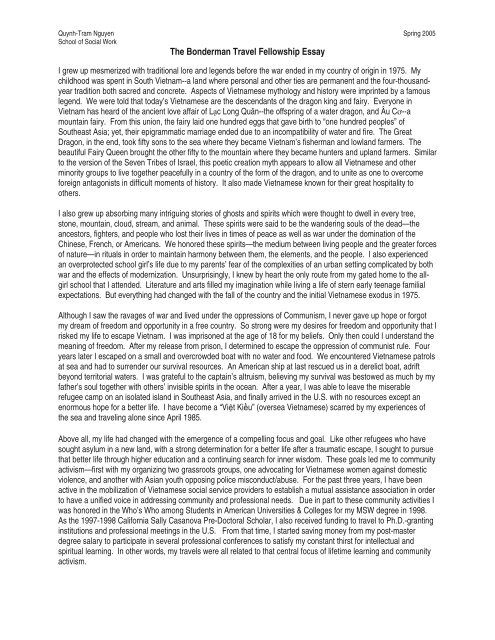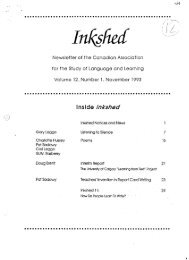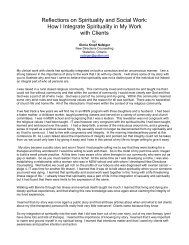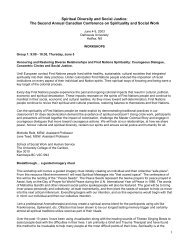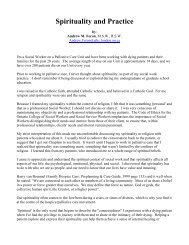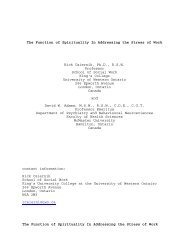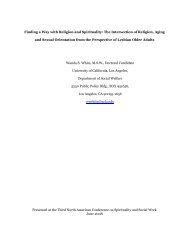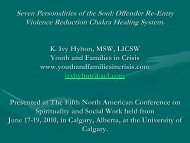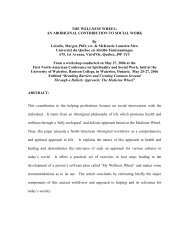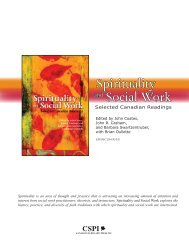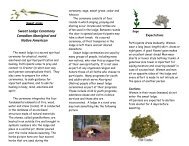The Bonderman Travel Fellowship Essay - St. Thomas University
The Bonderman Travel Fellowship Essay - St. Thomas University
The Bonderman Travel Fellowship Essay - St. Thomas University
You also want an ePaper? Increase the reach of your titles
YUMPU automatically turns print PDFs into web optimized ePapers that Google loves.
Quynh-Tram Nguyen Spring 2005<br />
School of Social Work<br />
<strong>The</strong> <strong>Bonderman</strong> <strong>Travel</strong> <strong>Fellowship</strong> <strong>Essay</strong><br />
I grew up mesmerized with traditional lore and legends before the war ended in my country of origin in 1975. My<br />
childhood was spent in South Vietnam--a land where personal and other ties are permanent and the four-thousandyear<br />
tradition both sacred and concrete. Aspects of Vietnamese mythology and history were imprinted by a famous<br />
legend. We were told that today’s Vietnamese are the descendants of the dragon king and fairy. Everyone in<br />
Vietnam has heard of the ancient love affair of Lạc Long Quân--the offspring of a water dragon, and Âu Cơ--a<br />
mountain fairy. From this union, the fairy laid one hundred eggs that gave birth to “one hundred peoples” of<br />
Southeast Asia; yet, their epigrammatic marriage ended due to an incompatibility of water and fire. <strong>The</strong> Great<br />
Dragon, in the end, took fifty sons to the sea where they became Vietnam’s fisherman and lowland farmers. <strong>The</strong><br />
beautiful Fairy Queen brought the other fifty to the mountain where they became hunters and upland farmers. Similar<br />
to the version of the Seven Tribes of Israel, this poetic creation myth appears to allow all Vietnamese and other<br />
minority groups to live together peacefully in a country of the form of the dragon, and to unite as one to overcome<br />
foreign antagonists in difficult moments of history. It also made Vietnamese known for their great hospitality to<br />
others.<br />
I also grew up absorbing many intriguing stories of ghosts and spirits which were thought to dwell in every tree,<br />
stone, mountain, cloud, stream, and animal. <strong>The</strong>se spirits were said to be the wandering souls of the dead—the<br />
ancestors, fighters, and people who lost their lives in times of peace as well as war under the domination of the<br />
Chinese, French, or Americans. We honored these spirits—the medium between living people and the greater forces<br />
of nature—in rituals in order to maintain harmony between them, the elements, and the people. I also experienced<br />
an overprotected school girl’s life due to my parents’ fear of the complexities of an urban setting complicated by both<br />
war and the effects of modernization. Unsurprisingly, I knew by heart the only route from my gated home to the allgirl<br />
school that I attended. Literature and arts filled my imagination while living a life of stern early teenage familial<br />
expectations. But everything had changed with the fall of the country and the initial Vietnamese exodus in 1975.<br />
Although I saw the ravages of war and lived under the oppressions of Communism, I never gave up hope or forgot<br />
my dream of freedom and opportunity in a free country. So strong were my desires for freedom and opportunity that I<br />
risked my life to escape Vietnam. I was imprisoned at the age of 18 for my beliefs. Only then could I understand the<br />
meaning of freedom. After my release from prison, I determined to escape the oppression of communist rule. Four<br />
years later I escaped on a small and overcrowded boat with no water and food. We encountered Vietnamese patrols<br />
at sea and had to surrender our survival resources. An American ship at last rescued us in a derelict boat, adrift<br />
beyond territorial waters. I was grateful to the captain’s altruism, believing my survival was bestowed as much by my<br />
father’s soul together with others’ invisible spirits in the ocean. After a year, I was able to leave the miserable<br />
refugee camp on an isolated island in Southeast Asia, and finally arrived in the U.S. with no resources except an<br />
enormous hope for a better life. I have become a “Việt Kiều” (oversea Vietnamese) scarred by my experiences of<br />
the sea and traveling alone since April 1985.<br />
Above all, my life had changed with the emergence of a compelling focus and goal. Like other refugees who have<br />
sought asylum in a new land, with a strong determination for a better life after a traumatic escape, I sought to pursue<br />
that better life through higher education and a continuing search for inner wisdom. <strong>The</strong>se goals led me to community<br />
activism—first with my organizing two grassroots groups, one advocating for Vietnamese women against domestic<br />
violence, and another with Asian youth opposing police misconduct/abuse. For the past three years, I have been<br />
active in the mobilization of Vietnamese social service providers to establish a mutual assistance association in order<br />
to have a unified voice in addressing community and professional needs. Due in part to these community activities I<br />
was honored in the Who’s Who among <strong>St</strong>udents in American Universities & Colleges for my MSW degree in 1998.<br />
As the 1997-1998 California Sally Casanova Pre-Doctoral Scholar, I also received funding to travel to Ph.D.-granting<br />
institutions and professional meetings in the U.S. From that time, I started saving money from my post-master<br />
degree salary to participate in several professional conferences to satisfy my constant thirst for intellectual and<br />
spiritual learning. In other words, my travels were all related to that central focus of lifetime learning and community<br />
activism.
As a former refugee and first-generation college student, I have encountered and conquered the following<br />
problems in my efforts to become educated: (1) coping with financial and physical survival; (2) adjusting to<br />
a new and dramatically different culture; and (3) learning English well enough to excel in academic courses.<br />
<strong>The</strong> tremendous support of many faculty and friends also encouraged me to overcome the stresses<br />
experienced by a refugee separated from her family, and provided a much needed and reliable support<br />
system. Above all, my experience with trauma has taught me to cope with the fears of ego and be who I<br />
truly am. <strong>The</strong>se life experiences have illuminated for me the meaning and nature of courage, patience,<br />
compassion, and faith. In addition, such experiences enhance my empathy with many Việt Kiều who are<br />
acutely aware of the conflicting loyalties to their original culture and the demands of adapting to their new<br />
host cultures. A significant number of Việt Kiều feel the need to maintain pre-revolutionary Vietnamese<br />
heritage and traditions, but many have negotiated a place within a more mainstreamed culture, while still<br />
others engage in the formation of distinct hybrid identities centering around dominant Western popular<br />
cultural forms and traditional cultural values. In short, diasporic Vietnamese identity has become multilayered<br />
and is in flux.<br />
For myself, my personal fear of the ocean has gradually subsided; yet fear of traveling alone outside<br />
America has endured. My sheltered childhood together with the trauma experienced by a boat person, who<br />
witnessed interpersonal violence during my flight and refugee camp period, as well as in poor American<br />
neighborhoods, has combined to make any travel to better understand the world seem only a fantastic<br />
dream. Every now and then I envy the lives of adventurous Western women as portrayed on television -<br />
persons unbound by a sense of geographical limits. I yearn for the opportunity to broaden my intellectual<br />
and personal horizons through travel to places where people have solved life’s puzzles through different<br />
cultures and societies. Yet the focus of my passion for knowledge and community activism distracts me<br />
from that dream and longing. I love to engage in work, practical or theoretical, that addresses issues of<br />
culture, art, war, trauma, survival, spirituality and development.<br />
After living twenty years in California, I recently decided to continue my journey to wisdom through the Ph.D.<br />
Program at UW. Recognizing self-transformation as a largely neglected but critical factor in wellness, I aim<br />
to develop spiritually-based models of prevention/ intervention that can be of demonstrated effectiveness in<br />
reducing the suffering of refugee and other displaced populations. I have joined others through mutual<br />
caring, connectedness, and growth at the community and societal level to fight against oppression and<br />
discrimination in a movement based on non-violence and compassion. This is a positive way to empower<br />
myself and disenfranchised populations. However, the opportunity to travel in order to broaden my<br />
worldview never seemed possible until I became aware of the <strong>Bonderman</strong> <strong>Fellowship</strong>.<br />
Unlike the first wave of Vietnamese refugees, whose family ties, resources and elite backgrounds assisted<br />
in merging into the new environment, later comers had to negotiate a difficult path of personal and cultural<br />
transitions. Like others, my feelings of elation and relief with arrival to asylum were overwhelmed by the<br />
tremendous losses—family bonds, soul mates, friendships, homeland, and shared identity. I made a dear<br />
friend in camp, who shared in these transitions. My friend and I particularly embraced our common<br />
experiences—being of the same age, having been rescued by the same ship, having volunteered as<br />
interpreters in the same refugee health clinic, and having taken the same language/cultural classes. At the<br />
end, we were two people traveling empty-handed getting on the same airplane to the US. But regrettably<br />
we parted from each other at SEATAC to start a new life. In due course we turned out to live very different<br />
lives after twenty years. My friend’s love of traveling became his obsession. Moreover, he was apt to live in<br />
the past, disclosing that the refugee camp time was his happiest. He, more than anybody else I’ve known,<br />
revisited these abandoned primitive camp locations several times, in addition to his exploration of other<br />
regions in the world. Our conversations were filled with his updated news of our former boat companions. I<br />
admired my friend’s powerful memories of that past, and his commitment not to forget. And so I was terribly<br />
2
grieved by his sudden death from cancer in spite of a life dedicated to being healthy in spirit, mind and body.<br />
As I experienced this huge personal loss, I felt myself being happy, realizing that he was at peace having<br />
had a chance to travel again to Vietnam and say goodbye to all his loved ones. I felt happy for his final<br />
return to Vietnam because Vietnamese, who died far from home without a family to tend their graves, were<br />
traditionally viewed with great pity. My friend did not become an unfortunate "wandering soul" after all.<br />
Ultimately, his soul will not perish in death, but will be reincarnated in another existence.<br />
In the view of ordinary Vietnamese persons, death and the dead are deemed a natural part of life. So,<br />
through my loss of a dear friend, I realize that death is not only an abstraction. This is perhaps the ultimate<br />
irony in the human condition: that death gives life its ultimate shape and meaning. Life on earth is but a<br />
temporary stop on the Vietnamese’s journey to death and other reincarnations. While dealing with his<br />
terminal illness, my friend mentioned his wish to be well and travel again - and not in a coach class seat! I<br />
believe he is now taking that next journey. And I believe that I will definitely fly with him again, next to each<br />
other on the same journey as we did twenty years ago. In the mean time, I would like to conquer my fear in<br />
order to travel abroad following my friend’s adventurous path. My temporary earthly farewell to my friend<br />
reaffirmed to me the idea that best way to meet death is to confront it, to live bravely and deeply despite its<br />
constant presence. I am interested in travel to certain areas of the world so I can capture awe through the<br />
colorful lens of Việt Kiều’s stories. I want to better understand how the Việt Kiều have managed their<br />
adjustments to new lands and peoples, and to help give voice to the richness of those lives. As the<br />
Vietnamese say, “In a river current, it is not the water in front that pulls the river along, but the water in the<br />
rear that acts as the driving force, pushing the water in front forward.” Through this prospective journey, the<br />
spirits of my friend and hundreds of thousands Vietnamese lost in the ocean will be the water in the back<br />
pushing me—the water in front moving forward…<br />
Through my own healing from trauma and losses, I have learned to accept and live my life as an act of<br />
unceasing prayer and offering to the Spirit. I regret none of my experiences because I realize that I exist to<br />
learn the lessons of life, to develop heart, and to embrace others. Through my intellectual journey, I have<br />
come to appreciate oral history for its democratic, human and intimate qualities in research, conducing<br />
better understanding and human solidarity. Talk story as a form allows for sharing in a context that does not<br />
call for censoring out the cultural and spiritual, which often happens in the secular world. For many Việt<br />
Kiều the physical journey was completed long time ago, but the emotional one is ongoing. Hence, seeking<br />
to express the spiritual essence of the Vietnamese people, to address what it means to be Vietnamese at<br />
this time in history is important to me, personally and professionally. If given the chance to travel to observe<br />
the Vietnamese diaspora in the world, I want to reflect upon the atypical dilemma of change caused by a<br />
turbulent century, leaving a rich culture split apart, with its people spread around the globe. <strong>The</strong> tragedy of<br />
‘boat people’ — tens of thousands of whom perished at sea or were victimized by pirates — and the<br />
extreme maltreatment and humiliation imposed on tens of thousands of others in re-education camps will<br />
not be easily forgotten. As mentioned earlier, this story of diaspora is actualized by the Vietnamese ancient<br />
legend symbolic of our kinship separation and forced migration. It also represents the possibilities of<br />
spiritual recovery, resolution of grief and troubled memories.<br />
Overall, I am interested in a synthesis of knowledge based in intellect with other ways of knowing based on<br />
a healing and reconciliation focus. My intention is to talk to many Việt Kiều exile artists, especially women,<br />
concentrated in at least two countries on each of three continents—Europe, Australia, and Asia. For<br />
example, my interest in visiting Paris in France and Berlin in Germany reflects the large number of Việt Kiều<br />
who live in those cities. Similarly, I am also inclined to visit Prague of Czech Republic where I could talk to<br />
Northern exile artists among the 60,000 Vietnamese resettled there as former guest workers. My outreach<br />
to them incorporates a personal effort to reconcile the historical conflicts between North and South<br />
Vietnamese. In addition, Sydney in Australia/New Zealand and New Caledonia — the islands in the South<br />
Pacific Ocean from east of Australia where many Vietnamese went to work in the colonized coffee<br />
plantations and later in the mines—would be priority destinations. Last but not least, I also interested in<br />
3
Northeast Thailand where more than 100,000 descendants of Viet Kieu who fled from not only political<br />
upheaval and persecution during the pre-colonial era in the late eighteenth century but also the communists<br />
during and after the Vietnam war.<br />
I am interested in listening to both young and old generations of exile artists and understand their individual<br />
motivations, talents, joys and fears through their paintings, film makings, confessions, diatribes, melodies<br />
and lyrics. As commonly agreed, artists have long been the voices of social criticism that prevails among<br />
people who feel unable to speak. Furthermore, “exile is compelling to think about, but terrible to<br />
experience,” especially for artists. I wish to have further insights of, and sensitivity to, these artists’ meaning<br />
of “home” and “healing” as well as their cultural impact on their host societies in the years before, during,<br />
and after the Vietnamese exodus. <strong>The</strong> more I research various spiritual traditions and faith practices, the<br />
more I’m convinced of a shared vision of “depth thinking” and “depth feeling” in the roots of suffering,<br />
oppression and alienation. I want to explore whether people hurt by the experience of war and relocation<br />
heal at their roots in order to feel again, and how people learn to live, beyond merely surviving,<br />
harmoniously with others, and heal deep wounds to spare the next generation from having to relive the older<br />
generations’ hurts. Engaging these issues as functions of the human spirit and heart level means not<br />
reducing faith to purely psychological or therapeutic principles.<br />
For Vietnamese artists living in exile, the camera and tape recorder seem to be a kind of validation -- the<br />
magical objects that make their lives more real. Certainly, I want to be a “star maker” to be able to portray<br />
their stories, not just my own. <strong>The</strong>ir stories would be explored as multi-faceted as the human spirit at small,<br />
turning-point moments while they seek an identity that transcends the political and social boundaries of both<br />
their adopted land and the space occupied by the memory of a land that is no longer theirs. I hope to bring<br />
to light some of the conflictual notions of identity in exile and the cultural production of national versus<br />
transnational imageries. I want to be exposed by their work that provides a vantage point for examining<br />
issues of dislocated and blurred identities that reconfigure Vietnamese imagery. Definitely, the lives of Việt<br />
Kiều artists would undermine any idea of uniformity in face of the widely divergent forms and content of their<br />
storytelling. <strong>The</strong>ir exile stories cannot be viewed only through the lens of war, tinted blood red and jungle<br />
green in other words. <strong>The</strong>y offer a valuable source of inspiration and information for my effort to revise the<br />
numerous ways of constructing cultural identities and defining the boundaries between them. As Edward<br />
Said and others have pointed out, exile also makes possible originality of vision. "Often it is when we<br />
journey," Marguerite Bouvard writes in her foreword to Landscape and Exile, "that we see the most clearly,<br />
both the places we have left, and the new and strange places of arrival." Without such conscientious<br />
attempts, only fairy tales of lives in transition are sustained. Without such determination to conquer fear of<br />
living to the fullest, only certain ways of knowing are nurtured. Thank you for your consideration.<br />
4


